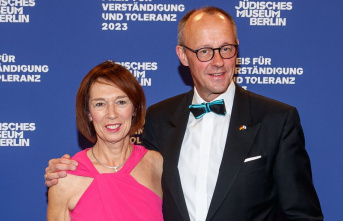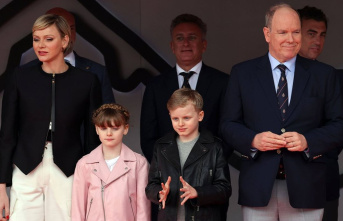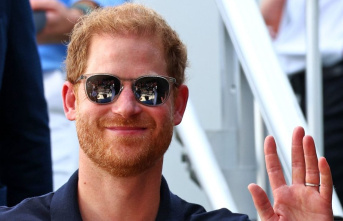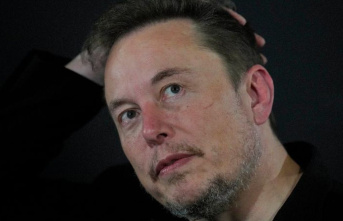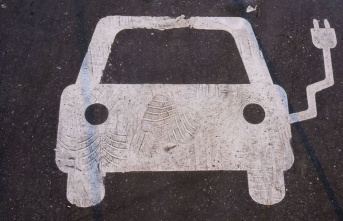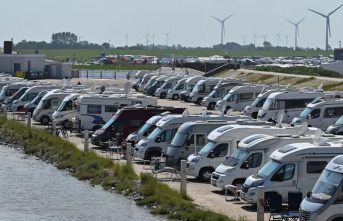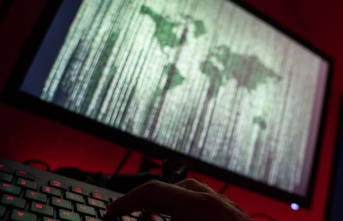Berlin also greets Easter Monday (April 10): In the second part of the crime thriller "Tatort: Nothing but the truth" (8:15 p.m., the first) it's up to the commissioners Robert Karow (Mark Waschke, 51) and Susanne Bonard ( Corinna Harfouch, 68) continued brilliantly. The two have stumbled upon a right-wing network and are digging deeper and deeper. What began with the murder of a security police officer ends with a dramatic showdown.
Robert Karow is called to a crime scene. The young police officer Rebecca Kästner (Kaya Marie Möller, 37) lies dead in her apartment. There are many indications of suicide: drugs, custody battle and being overwhelmed. But when the inspector finds his four-year-old son Matti (Yvon Moltzen) frightened in the garden, he begins to have doubts. What mother takes her own life in front of her own child?
In addition, she dialed an unusual number before her death - that of Susanne Bonard. The former LKA size now teaches at the police academy. She is an absolute luminary in her field and has written a standard work that everyone knows. Before Karow even realizes what is happening to him, she is at his side for the investigation. But he is skeptical - at the age of 62 she wants to go back on the road again?
Bonard was in the process of uncovering right-wing tendencies in the academy. She no longer wanted to put up with the muzzle she received from the director and also wanted to take action against the dubious teaching methods of her colleague Götz Lennart (Thomas Niehaus, born 1981). But Bonard and Karow also found connections to the right-wing scene during the investigation into the policewoman's death. The LKA size quickly suspects a large network. Karow thinks this is paranoid at first, but slowly he too has to realize that they are really confronted with a larger context than previously thought.
Karow and Bonard continue to investigate the death of Rebecca Kästner when they are called to the next crime scene. The police officer Tina Gebhardt (Bea Brocks, 34), who was in a unit with Kästner, was shot. On an old factory site, she was on duty together with her colleague Guido Konrad (Christoph Jöde, born 1985) to apprehend an alleged drug dealer. Konrad can also name the perpetrator: a Syrian unskilled worker named Fawad Saad (Aziz Dyab, born 1995), who worked on the construction sites of Dietrich Pätzold (Jörn Hentschel, born 1969). Konrad shot the alleged perpetrator. But Bonard and Karow have their doubts about the story, and one person seems to have been on the site.
The two had just found out through Gebhardt that she was involved in an illegal arms trade and was active in a right-wing chat group. But Anton Reitemeier (Tilo Nest, born 1960) from the Office for the Protection of the Constitution had put a spanner in the works and stopped the interrogation of the police officer. Was it Gebhardt who shot Kästner? Or who else? And how is the security company SAC with its boss Arne Koch (Sebastian Hülk, 48) involved in the whole thing? The network keeps growing as the investigation progresses. In the end, a race against time begins and Bonard and Karow try to prevent the worst...
Absolutely. Because especially in the second part of "Nothing but the truth" the case picks up speed much faster than in part one. After the suspect Tina Gebhardt was shot dead during the operation, events take a turn for the worse. This makes it difficult to follow the whole thing in some places. Because many names are mentioned, connections are dealt with quickly - which is why one or the other can also get lost. Attention is definitely required here.
In addition, some questions remain unanswered at the end - which is also due to the complex subject matter. However, the creators managed to keep the suspense up until the end and to pack a political topic, the right-wing infiltration of society, into a crime story guise. It is important and right that a format like "Tatort" takes on such a current topic and asks uncomfortable questions. "As long as you don't start questioning your own thought patterns and 'blind' spots in depth, I think democracy is always at risk," says screenwriter Katja Wenzel. "Even our cultural landscape." Co-author Stefan Kolditz (b. 1956) notes, "Even if our story's exaggeration is fiction, believing something is impossible doesn't make it impossible."
A network consisting of police officers, prosecutors and judges who want to rebuild the country and democracy? What sounds like a novel about conspiracy theories is not so far from reality. "One of the leading masterminds of the attempted Reichsbürger coup d'état worked as a judge at the Berlin district court," says Wenzel. Or the federal executive board of the CDU must now attest to the ex-Verfassungsschutz President Hans-Georg Maassen (60) right-wing extremist statements. There are some cases that show that right-wing ideas are not only to be found on the fringes of society. "This can be observed across Europe. Right-wing, nationalistic and patriarchal tendencies are gaining strength again," warns the screenwriter.
In addition to the serious issues, however, one enjoys watching Commissioners Karow and Bonard. The two are getting closer and closer, becoming a team - and that in a very short time. One can only hope that the next case of the two will not be long in coming.



